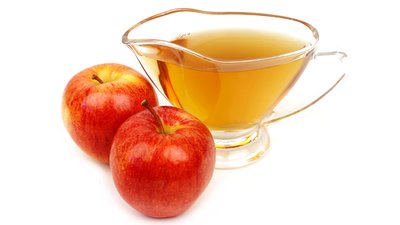It's not too often you hear about salad dressing turning into the latest health-and-wellness craze. It's even less common that a natural household cleaning product becomes the next big thing in nutrition. But both are part of the story of apple cider vinegar.
This tart kitchen staple has developed an immense reputation as a superfood that can do everything from helping control blood sugar levels to aiding in weight loss.
So is vinegar a "one shot cure-all"? The existing science seems to say it isn't. Still, there are some benefits you can get from incorporating this fermented liquid into your daily diet. Here's a closer look.
What Is Apple Cider Vinegar?
Apple cider vinegar (ACV) has a long history of use in cooking and cleaning, but more recently there has been a growing interest in its purported health benefits.

Apple cider vinegar starts out as apple juice, but once yeast is added the fruit sugar is converted to alcohol, essentially fermenting the liquid. Bacteria turn the alcohol into acetic acid, giving vinegar its sour taste and pungent smell.
What Does Apple Cider Vinegar Do?
Traditionally, vinegar has been a staple in many food dishes, salad dressings, and condiments as a way to add extra flavor, extend shelf life, or assist with pickling. Currently it's being marketed more for its potential health benefits, largely thanks to acetic acid.
What Is Acetic Acid?
The active component of vinegar is acetic acid, which is a short chain fatty acid (SCFA) that your body also produces as a byproduct whenever fat is turned into fuel (beta-oxidation). SCFAs have been shown to directly improve glycemic control, thereby reducing the risk of type 2 diabetes. Acetic acid has also been shown to lower fasting plasma glucose, as well as increase insulin sensitivity.[1] ACV contains between 4-8 percent acetic acid.[2]
What Are the Potential Benefits of Apple Cider Vinegar?
Helps Control Blood Sugar: Vinegar has been shown in several studies to improve glycemic control in healthy subjects. One of the first studies to show this was one in which participants added vinegar to a salad prior to bread consumption and observed lower blood glucose levels compared to the same meal without vinegar.[3]
Subsequent studies have shown ACV to decrease both insulin and glucose response following carb-containing meals, as well as to help people feel more full for longer.[4-6]
Results from these studies suggest that post-meal glucose and insulin response is lowered for up to two hours with vinegar consumption.[7] The majority of these studies used vinegar amounts achievable as part of a normal daily diet, equivalent to acetic acid doses between 0.5 and 2 grams, and have been consumed with 50-75 grams of carbohydrates per meal.
Despite the promise ACV shows for regulating blood sugar in healthy people, results from studies of people with diabetes have been inconclusive. Both short-term and long-term studies of the effects of vinegar on people with type 2 diabetes failed to show significant improvements in blood glucose levels or body weight. [8,9]
Packed With Polyphenols: Vinegar contains chemicals known as polyphenols. Polyphenols are phytonutrients (plant-based micronutrients) that function like antioxidants and have been shown to promote gut health and fight bad bacteria.
Polyphenols may also help improve immune function, slow the aging process, improve recovery after workouts, and reduce body fat.[10] But studies on whether supplemental ACD is enough to actually prevent any of these diseases are inconclusive.[11,12]
Can Apple Cider Vinegar Help Me Lose Weight?
Though some studies have been promising, there's little evidence that drinking apple cider vinegar will help you lose weight. There are a handful of animal studies suggesting vinegar, or acetic acid, can suppress the accumulation of abdominal fat and serve as a protective measure to avoid excessive weight gain following a high-calorie diet. However, the findings from human trials are less convincing.
A study published in the International Journal of Obesity using healthy, normal-weight volunteers found that ingestion of ACV prior to a meal increased feelings of fullness.[13] But this was largely due to poor tolerability of the vinegar and subsequent feelings of nausea.
Is Apple Cider Vinegar Good for My Skin?
There's no science to back this one up, but there's plenty of anecdotal evidence for washing your face with ACV. Similar to an astringent product that you can pick up at your local drugstore, the acid component of ACV can help clean off any dirt or leftover makeup from your skin, potentially leaving you with smoother, drier skin.
If you suffer from oily skin, you could try dabbing some diluted ACV on trouble areas to help keep the area dry and reduce the appearance of pimples or age spots.

Just remember that ACV is strong, so make sure to dilute it before applying to your face, and avoid your eyes, nose, and mouth. It's also advisable to test ACV on a small area of your skin before applying it all over—just to make sure you don't suffer from an allergic reaction.
What Are the Side Effects of Drinking Apple Cider Vinegar?
Short term ingestion studies with vinegar beverages suggest they are relatively safe, but consumer-relevant efficacy remains to be explored.
After several reports claiming ACV ingestion could lead to esophageal injury, a 2005 study examined eight different ACV products and found that acidity levels ranged from a pH of 2.9 to 5.7. Some of the products tested contained 3-5 times more acid than regular vinegar.[14]
Consuming high levels of acid-containing products can have detrimental effects on your teeth, throat, and GI system. To avoid these complications, it's best to add vinegar to your foods rather than take shots of it. Try mixing it into a marinade, using it as a salad dressing, or putting it in your soup. Think of it as a calorie-free way to add lots of flavor (and perhaps a few health benefits) to your food!
If you do want to drink it, water it down so you are not consuming a concentrated version of the stuff. To minimize any potential injury, mix 1-2 tablespoons of ACV in 8 ounces of water. Consuming more than 3 tablespoons of ACV a day may leave you with a less-than-desirable burning sensation in the back of your throat, and could make you nauseated.
What Are the Available Forms of Apple Cider Vinegar?
The most common form of ACV can be found on the same shelf as all the other cooking vinegars. If you frequent health food stores you may come across pre-mixed drinks containing ACV. Just be mindful of the ingredient labels, as some drinks may add extra sugar and calories to help mask the bitter taste of vinegar.
Acetic acid, apple cider vinegar's active ingredient, can be found in other vinegar varieties, too, like balsamic and malt. There are some traditional Asian foods that contain a high amount of acetic acid from vinegar, although few studies have tested whether consuming these foods is as effective as supplementing with vinegar or acetic acid by itself. Vinegar is commonly used in sushi, kimchi, tom-yum soup, and salad dressings.
Will A Spoonful of ACV Keep the Doctor Away?
Although there isn't much definitive evidence at this point to support the role of apple cider vinegar as a weight-loss tool or treatment for chronic diseases like type 2 diabetes and cancer, it is considered relatively safe to consume in reasonable amounts. It's definitely not a "miracle worker," but it could offer potential benefits, especially when it comes to blood sugar control.
If you do want to give ACV a shot, just make sure you don't go over the recommend 3 tablespoons a day, and you should be good to go.
References
- Robertson, M. D., Bickerton, A. S., Dennis, A. L., Vidal, H., & Frayn, K. N. (2005). Insulin-sensitizing effects of dietary resistant starch and effects on skeletal muscle and adipose tissue metabolism. The American Journal of Clinical Nutrition, 82(3), 559-567.
- Morales, M. L., Gonzalez, A. G., & Troncoso, A. M. (1998). Ion-exclusion chromatographic determination of organic acids in vinegars. Journal of Chromatography A, 822(1), 45-51.
- Brighenti, F., Castellani, G., Benini, L., Casiraghi, M. C., Leopardi, E., Crovetti, R., & Testolin, G. (1995). Effect of neutralized and native vinegar on blood glucose and acetate responses to a mixed meal in healthy subjects. European Journal of Clinical Nutrition, 49(4), 242-247.
- Liljeberg, H., & Björck, I. (1998). Delayed gastric emptying rate may explain improved glycaemia in healthy subjects to a starchy meal with added vinegar. European Journal of Clinical Nutrition, 52(5), 368-371.
- Ostman, E., Granfeldt, Y., Persson, L., & Bjorck, I. (2005). Vinegar supplementation lowers glucose and insulin responses and increases satiety after a bread meal in healthy subjects. European Journal of Clinical Nutrition, 59(9), 983.
- Johnston, C. S., Steplewska, I., Long, C. A., Harris, L. N., & Ryals, R. H. (2010). Examination of the antiglycemic properties of vinegar in healthy adults. Annals of Nutrition and Metabolism, 56(1), 74-79.
- Shishehbor, F., Mansoori, A., & Shirani, F. (2017). Vinegar consumption can attenuate postprandial glucose and insulin responses; a systematic review and meta-analysis of clinical trials. Diabetes Research and Clinical Practice.
- 8. van Dijk, J. W., Tummers, K., Hamer, H. M., & van Loon, L. J. (2012). Vinegar co-ingestion does not improve oral glucose tolerance in patients with type 2 diabetes. Journal of Diabetes and its Complications, 26(5), 460-461.
- Johnston, C. S., White, A. M., & Kent, S. M. (2009). Preliminary evidence that regular vinegar ingestion favorably influences hemoglobin A1c values in individuals with type 2 diabetes mellitus. Diabetes Research and Clinical Practice, 84(2), e15-e17.
- Li, A. N., Li, S., Zhang, Y. J., Xu, X. R., Chen, Y. M., & Li, H. B. (2014). Resources and biological activities of natural polyphenols. Nutrients, 6(12), 6020-6047.
- Bouazza, A., Bitam, A., Amiali, M., Bounihi, A., Yargui, L., & Koceir, E. A. (2016). Effect of fruit vinegars on liver damage and oxidative stress in high-fat-fed rats. Pharmaceutical Biology, 54(2), 260-265.
- Nazıroğlu, M., Güler, M., Özgül, C., Saydam, G., Küçükayaz, M., & Sözbir, E. (2014). Apple cider vinegar modulates serum lipid profile, erythrocyte, kidney, and liver membrane oxidative stress in ovariectomized mice fed high cholesterol. The Journal of Membrane Biology, 247(8), 667-673.
- Darzi, J., Frost, G. S., Montaser, R., Yap, J., & Robertson, M. D. (2014). Influence of the tolerability of vinegar as an oral source of short-chain fatty acids on appetite control and food intake. International Journal of Obesity, 38(5), 675-681.
- Hill, L. L., Woodruff, L. H., Foote, J. C., & Barreto-Alcoba, M. (2005). Esophageal injury by apple cider vinegar tablets and subsequent evaluation of products. Journal of the American Dietetic Association, 105(7), 1141-1144



